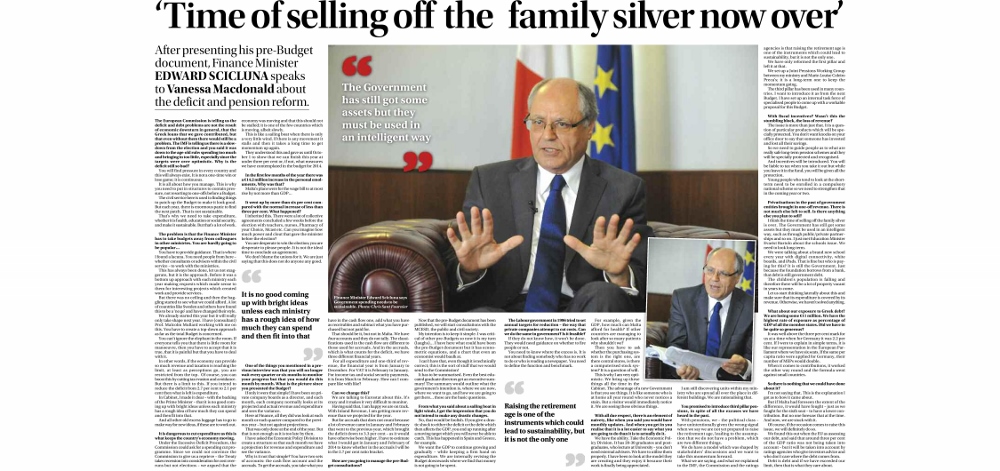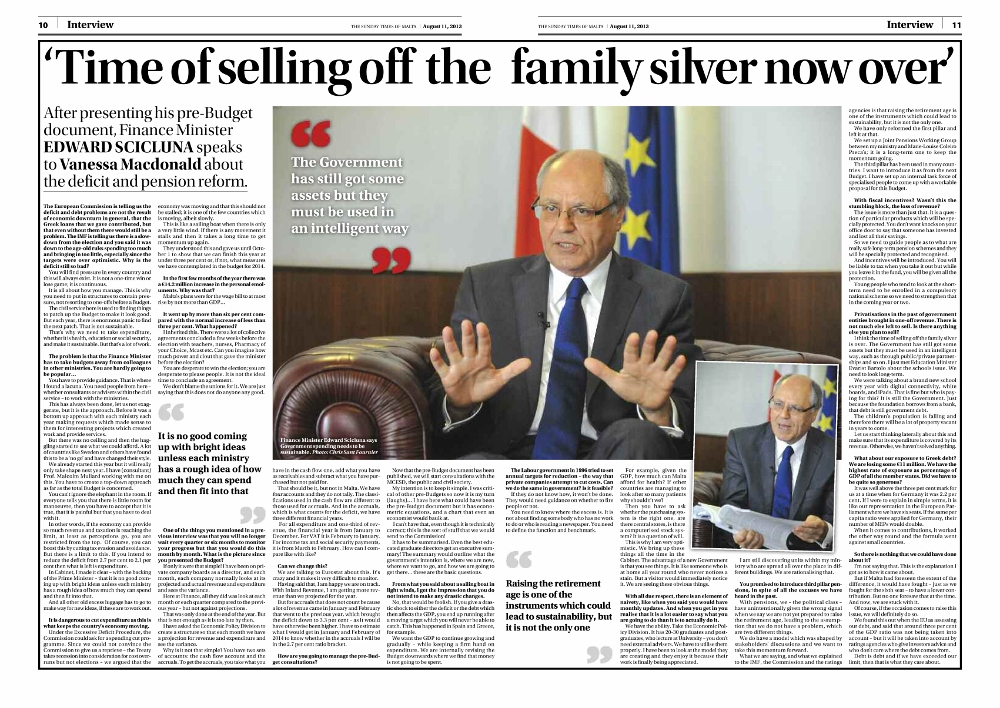After presenting his pre-Budget document, Finance Minister Edward Scicluna speaks to Vanessa Macdonald about the deficit and pension reform.
The European Commission is telling us the deficit and debt problems are not the result of economic downturn in general, that the Greek loans that we gave contributed, but that even without them there would still be a problem. The IMF is telling us there is a slowdown from the election and you said it was down to the age-old rule: spending too much and bringing in too little, especially since the targets were over optimistic. Why is the deficit still so bad?
You will find pressure in every country and this will always exist. It is not a one-time win or lose game; it is continuous.
It is all about how you manage. This is why you need to put in structures to contain pressure, not resorting to one-offs before a Budget.
The civil service here is used to finding things to patch up the Budget to make it look good. But each year, there is enormous panic to find the next patch. That is not sustainable.
That’s why we need to take expenditure, whether it is health, education or social security, and make it sustainable. But that’s a lot of work.
The problem is that the Finance Minister has to take budgets away from colleagues in other ministries. You are hardly going to be popular…
You have to provide guidance. That is where I found a lacuna. You need people from here – whether consultants or advisers within the civil service – to work with the ministries.
This has always been done, let us not exaggerate, but it is the approach. Before it was a bottom up approach with each ministry each year making requests which made sense to them for interesting projects which created work and provide services.
But there was no ceiling and then the haggling started to see what we could afford. A lot of countries like Sweden and others have found this to be a ‘no go’ and have changed their style.
We already started this year but it will really only take shape next year. I have (consultant) Prof. Malcolm Mullard working with me on this. You have to create a top-down approach as far as the total Budget is concerned.
You can’t ignore the elephant in the room. If everyone tells you that there is little room for manoeuvre, then you have to accept that it is true, that it is painful but that you have to deal with it.
In other words, if the economy can provide so much revenue and taxation is reaching the limit, at least as perceptions go, you are restricted from the top. Of course, you can boost this by cutting tax evasion and avoidance. But there is a limit to this. If you intend to reduce the deficit from 2.7 per cent to 2.1 per cent then what is left is expenditure.
In Cabinet, I made it clear – with the backing of the Prime Minister – that it is no good coming up with bright ideas unless each ministry has a rough idea of how much they can spend and then fit into that.
And all other old excess luggage has to go to make way for new ideas, if these are to work out.
It is dangerous to cut expenditure as this is what keeps the country’s economy moving.
Under the Excessive Deficit Procedure, the Commission could ask for a spending cut programme. Since we could not convince the Commission to give us a reprieve – the Treaty takes recession into consideration for cost overruns but not elections – we argued that the economy was moving and that this should not be stalled; it is one of the few countries which is moving, albeit slowly.
This is like a sailing boat when there is only a very little wind. If there is any movement it stalls and then it takes a long time to get momentum up again.
They understood this and gave us until October 1 to show that we can finish this year at under three per cent or, if not, what measures we have contemplated in the budget for 2014.
In the first few months of the year there was a €14.2 million increase in the personal emoluments. Why was that?
Malta’s plans were for the wage bill to at most rise by not more than GDP…
It went up by more than six per cent compared with the normal increase of less than three per cent. What happened?
I inherited this. There were a lot of collective agreements concluded a few weeks before the election with teachers, nurses, Pharmacy of your Choice, Mcast etc. Can you imagine how much power and clout that gave the minister before the election?
You are desperate to win the election; you are desperate to please people. It is not the ideal time to conclude an agreement.
We don’t blame the unions for it. We are just saying that this does not do anyone any good.
“It is no good coming up with bright ideas unless each ministry has a rough idea of how much they can spend and then fit into that”
One of the things you mentioned in a previous interview was that you will no longer wait every quarter or six months to monitor your progress but that you would do this month by month. What is the picture since you presented the Budget?
If only it were that simple! I have been on private company boards as a director, and each month, each company normally looks at its projected and actual revenue and expenditure and sees the variance.
Here at Finance, all they did was look at each month or each quarter compared to the previous year – but not against projections.
That was only done at the end of the year. But that is not enough as it is too late by then.
I have asked the Economic Policy Division to create a structure so that each month we have a projection for revenue and expenditure and see the variance.
Why is it not that simple? You have two sets of accounts: the cash flow account and the accruals. To get the accruals, you take what you have in the cash flow one, add what you have as receivables and subtract what you have purchased but not paid for.
That should be it, but not in Malta. We have four accounts and they do not tally. The classifications used in the cash flow are different to those used for accruals. And in the accruals, which is what counts for the deficit, we have three different financial years.
For all expenditure and one-third of revenue, the financial year is from January to December. For VAT it is February to January. For income tax and social security payments, it is from March to February. How can I compare like with like?
Can we change this?
We are talking to Eurostat about this. It’s crazy and it makes it very difficult to monitor.
Having said that, I am happy we are on track. With Inland Revenue, I am getting more revenue than we projected for the year.
But for accruals that does not count because a lot of revenue came in January and February that went to the previous year, which brought the deficit down to 3.3 per cent – as it would have otherwise been higher. I have to estimate what I would get in January and February of 2014 to know whether in the accruals I will be in the 2.7 per cent ratio bracket.
How are you going to manage the pre-Budget consultations?
Now that the pre-Budget document has been published, we will start consultations with the MCESD, the public and civil society.
My intention is to keep it simple. I was critical of other pre-Budgets so now it is my turn (laughs)… I have here what could have been the pre-Budget document but it has econometric equations, and a chart that even an economist would baulk at.
I can’t have that, even though it is technically correct; this is the sort of stuff that we would send to the Commission!
It has to be summarised. Even the best educated graduate directors get an executive summary! The summary would outline what the government’s intention is, where we are now, where we want to go, and how we are going to get there… these are the basic questions.
From what you said about a sailing boat in light winds, I get the impression that you do not intend to make any drastic changes.
No, that would be foolish. If you give a drastic shock to either the deficit or the debt which then affects the GDP, you end up running after a moving target which you will never be able to catch. This has happened in Spain and Greece, for example.
We want the GDP to continue growing and gradually – while keeping a firm hand on expenditure. We are internally revising the Budget downwards where we find that money is not going to be spent.
“Raising the retirement age is one of the instruments which could lead to sustainability, but it is not the only one”
The Labour government in 1996 tried to set annual targets for reduction – the way that private companies attempt to cut costs. Can we do the same in government? Is it feasible?
If they do not know how, it won’t be done. They would need guidance on whether to fire people or not.
You need to know where the excess is. It is not about finding somebody who has no work to do or who is reading a newspaper. You need to define the function and benchmark.
For example, given the GDP, how much can Malta afford for health? If other countries are managing to look after so many patients why shouldn’t we?
Then you have to ask whether the purchasing system is the right one, are there central stores, is there a computerised stock system? It is a question of will.
This is why I am very optimistic. We bring up these things all the time in the Cabinet. The advantage of a new Government is that you see things. It is like someone who is at home all year round who never notices a stain. But a visitor would immediately notice it. We are seeing these obvious things.
With all due respect, there is an element of naivety, like when you said you would have monthly updates. And when you get in you realise that it is a lot easier to say what you are going to do than it is to actually do it.
We have the ability. Take the Economic Policy Division. It has 20-30 graduates and postgraduates, who lecture at University – you don’t need external advisers. We have to utilise them properly. I have been to look at the model they are creating and they enjoy it because their work is finally being appreciated.
I am still discovering units within my ministry who are spread all over the place in different buildings. We are rationalising that.
You promised to introduce third pillar pensions, in spite of all the excuses we have heard in the past.
With pensions, we – the political class – have unintentionally given the wrong signal when we say we are not yet prepared to raise the retirement age, leading to the assumption that we do not have a problem, which are two different things.
We do have a model which was shaped by stakeholders’ discussions and we want to take this momentum forward.
What we are saying, and what we explained to the IMF, the Commission and the ratings agencies is that raising the retirement age is one of the instruments which could lead to sustainability, but it is not the only one.
We have only reformed the first pillar and left it at that.
We set up a Joint Pensions Working Group between my ministry and Marie-Louise Coleiro Preca’s; it is a long-term one to keep the momentum going.
The third pillar has been used in many countries. I want to introduce it as from the next Budget. I have set up an internal task force of specialised people to come up with a workable proposal for this Budget.
With fiscal incentives? Wasn’t this the stumbling block, the loss of revenue?
The issue is more than just that. It is a question of particular products which will be specially protected. You don’t want knocks on your office door to say that someone has invested and lost all their savings.
So we need to guide people as to what are really safe long-term pension schemes and they will be specially protected and recognised.
And incentives will be introduced. You will be liable to tax when you take it out but while you leave it in the fund, you will be given all the protection.
Young people who tend to look at the short-term need to be enrolled in a compulsory national scheme so we need to strengthen that in the coming year or two.
Privatisations in the past of government entities brought in one-off revenue. There is not much else left to sell. Is there anything else you plan to sell?
I think the time of selling off the family silver is over. The Government has still got some assets but they must be used in an intelligent way, such as through public/private partnerships and so on. I just met Education Minister Evarist Bartolo about the schools issue. We need to look long-term.
We were talking about a brand new school every year with digital connectivity, white boards, and iPads. That is fine but who is paying for this? It is still the Government. Just because the foundation borrows from a bank, that debt is still government debt.
The children’s population is falling and therefore there will be a lot of property vacant in years to come.
Let us start thinking laterally about this and make sure that its expenditure is covered by its revenue. Otherwise, we haven’t solved anything.
What about our exposure to Greek debt? We are losing some €11 million. We have the highest rate of exposure as percentage of GDP of all the member states. Did we have to be quite so generous?
It was well above the three per cent mark for us at a time when for Germany it was 2.2 per cent. If I were to explain in simple terms, it is like our representation in the European Parliament where we have six seats. If the same per capita ratio were applied for Germany, their number of MEPs would double.
When it comes to contributions, it worked the other way round and the formula went against small countries.
So there is nothing that we could have done about it?
I’m not saying that. This is the explanation I got as to how it came about.
But if Malta had foreseen the extent of the difference, it would have fought – just as we fought for the sixth seat – to have a lower contribution. But no one foresaw that at the time. And now, we are stuck with it.
Of course, if the occasion comes to raise this issue, we will definitely do so.
We found this out when the EU as assessing our debt, and said that around three per cent of the GDP ratio was not being taken into account – but it will be taken into account by ratings agencies who give investors advice and who don’t care where the debt comes from.
Debt is debt and if we have exceeded our limit, then that is what they care about.
– Sunday, 11th August, 2013.



2 responses to “‘Time of selling off the family silver now over’ – Interview with the Times of Malta”
I was reading some of your articles on this website
and I conceive this web site is rattling informative! Continue posting.Money from blog
Fisher B, Costantino J, Wickerham DL, Cecchini RS, Cronin WM, Robidoux A, Bevers TB, Kavanah M, Atkins J, Margolese R, Runowicz CD, James J, Ford L, Wolmark N J Natl Cancer Inst buy cialis online from india